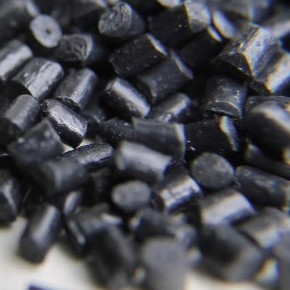
Axion: Collaborate to create end markets for recycled polymers
Collaboration between injection moulders and manufacturers, and plastic recyclers is vital to creating new end markets for recycled polymers, meet rising demand for recycled content and improve the overall economics of recycling, says Axion Polymers.
With more manufacturers, especially those in the automotive and electrical sectors, seeking to increase recycled content in new goods, the Manchester-based plastics recycler suggests this presents opportunities for injection moulders to consider alternatives to virgin material.
At Axion‘s two processing sites, plastics recovered from end-of-life vehicles (auto shredder waste) and waste electrical goods are refined into high-quality engineering polymers that match virgin material quality.
The bespoke recycled Axpoly(r) and Axplas(r) polymers can be tailored to suit clients’ specifications for use in an extensive range of new products.
The economic feasibility of recycling depends upon stable end markets, that justify the cost of processing. Moulders who work with recyclers on understanding physical polymer properties, and crucially, engage in practical trials to understand the suitability of a recycled polymer in new applications can gain a competitive advantage in emerging circular economy markets.
Ambitious aims on the recycling of packaging, and a growing desire to recycle more non-packaging products, including plastics from End of Life Vehicles and Waste Electronics and Electrical equipment, are driving manufacturers to look for new solutions and incorporate more recycled content.
Worries over a proposed tax on packaging without recycled content being possibly extended to other markets is also cited as a driver for the desire to include recycled materials in new goods.
Some closed loop recycling exists, primarily in PET and HDPE packaging. Although closed loop recycling is not pivotal, if it can be achieved it allows for the same grade of polymer to be reused in the same application – this removes some of the technical barriers of using recycled content.
However, in many cases, closed loop cannot be achieved because products may be collected in a mixed stream, where separation of different polymer grades is not technically or economically possible.
In this case, manufacturers need to consider using alternative polymer types or blends if they want to increase recycled content.
This brings a potential technical barrier.
In many cases, a moulded product is designed to use a specific grade of polymer with very specific properties. The company that produces the moulded product may not be involved in specifying the material, and so will be reluctant to use any polymer that does not conform to the exact original specification.
The potential technical barrier then becomes a ‘resistance’ to use recycled content, due to past perceptions about its ability to meet virgin material specifications and perceptions about the quality of recycled materials.
In many cases however, products do not need such rigid specifications, and in reality, a wide range of different grades of a polymer or even different blends of polymers may work well in certain applications.
Blending PE and PP from plastic film to use in injection moulding of ‘PP’ products is a prime example of what can work successfully.
Products such as crates, bins and buckets can even benefit from a PE/PP blend, as the properties can complement each other.
Axion Polymers Business Development Manager Mark Keenan says although physical properties of recycled polymers are important to measure, conducting trials using the material provides a more detailed picture.
He commented: “Moulders should work with recyclers to ensure that the recycled polymer is as suitable as possible for an application.
“At Axion Polymers, we work with our customers to get recycled content into their products or help them use a different polymer formulation altogether.
“We assist moulders at every step, right through to setting up their machinery to enable them to use alternative recycled polymers. Practical trials are the only way to truly understand the suitability of a recycled polymer.
“With the desire to recycle more and more materials, end markets need to be continuously developed. Full supply chain collaboration can ensure there are stable end markets and provide the “pull” effect to boost the overall economics of recycling.”
Twitter: @axion_group
LinkedIn: Axion Group
Contact Axion: [email protected]
Visit Supplier's page
Latest news

18th December 2024
BMBI: October Merchant sales rally with a +7.3% month-on-month increase
The latest Builders Merchant Building Index (BMBI) report shows builders’ merchants’ value sales in October were up +1.2% compared to the same month last year.
Posted in Articles, Bathrooms & Toilets, Bricks & Blocks, Building Associations & Institutes, Building Industry News, Building Products & Structures, Building Services, Building Systems, Civil Engineering, Cladding, Concrete, Cement, Admixtures, Drainage, Drainage Services, Floors, Garden, Hand Tools, Hard Landscaping & Walkways, Health & Safety, Heating Systems, Controls and Management, Heating, Ventilation and Air Conditioning - HVAC, Information Technology, Interior Design & Construction, Interiors, Landscaping, news, Paints, Paints, Coatings & Finishes, Pipes, Pipes & Fittings, Plant, Equipment and Hire, Plumbing, Power Tools, Publications, Research & Materials Testing, Restoration & Refurbishment, Retrofit & Renovation, Site Preparation, Sustainability & Energy Efficiency, Timber Buildings and Timber Products, Walls, Waste Management & Recycling
18th December 2024
GEZE UK announce Kids' Village charity partnership
Kids’ Village is delighted to have partnered with GEZE UK as their 2025 charity of the year – find out more via the article…
Posted in Access Control & Door Entry Systems, Architectural Ironmongery, Articles, Building Industry Events, Building Industry News, Building Products & Structures, Building Services, Charity work, Doors, Facility Management & Building Services, Health & Safety, Restoration & Refurbishment, Retrofit & Renovation, Security and Fire Protection, Windows
18th December 2024
Encon Achieves 5% Club Silver Membership
The Encon Group, the leading independent distributor of building materials, is pleased to announce that it has been awarded Silver membership of The 5% Club by the 2024/25 Employer Audit Scheme.
Posted in Articles, Awards, Bricks & Blocks, Building Associations & Institutes, Building Industry Events, Building Industry News, Building Products & Structures, Building Regulations & Accreditations, Building Services, Building Systems, Civil Engineering, Cladding, Concrete, Cement, Admixtures, Facades, Hard Landscaping & Walkways, Health & Safety, Insulation, Landscaping, Plant, Equipment and Hire, Recruitment, Restoration & Refurbishment, Retrofit & Renovation, Site Preparation, Training, Walls
18th December 2024
SWA: A focus on Steel Window Association member West Leigh
Located in Charlton, South London, SWA member West Leigh was established during the Blitz, in 1943. During the destruction in London, the company helped in repairing windows and facades that had been damaged by bombings throughout the city.
Posted in Articles, Building Associations & Institutes, Building Industry News, Building Products & Structures, Building Services, Building Systems, Case Studies, Facades, Glass, Glazing, Restoration & Refurbishment, Retrofit & Renovation, Steel and Structural Frames, Walls, Windows
 Sign up:
Sign up: